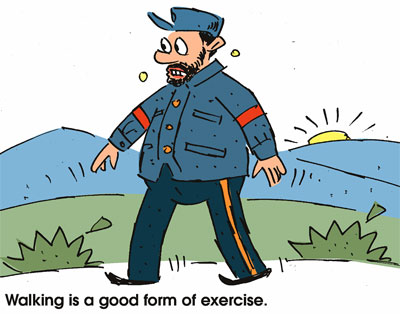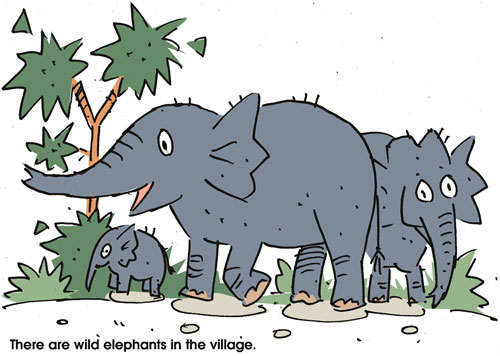|

by R. S. Karunaratne
Infinitives and ‘-ing’ forms
In grammar, the infinitive is the basic form of a verb that usually
follows ‘to.’
I had to leave the country.
She had to raise five children.

Teachers have to update their knowledge regularly.
You have to help me in this situation.
Children like to eat sweets.
In the following sentences the verb in itself is an infinitive. It is
used without ‘to.’
I must go now.
You should speak the truth.
Can I help you?
We have problems at certain universities.
I can’t do it.
We can use ‘-ing’ forms as subjects.
Smoking is injurious to health.
Walking is a good form of exercise.
Sleeping during the day should be avoided.
Learning a language is a pleasurable activity.
Seeing is believing.
After some verbs we use infinitives.
She expects to pass her examinations with flying colours.
I hope to be back in the island soon.
We decided to go by bus.
The students want to play.
Nobody likes to work here.
With some verbs we use ‘-ing’ forms.
He’ll finish studying in 2016.
She keeps telephoning me everyday.
Stop smoking in public places.
Avoid telling lies.
Keep collecting coins.
After prepositions we use ‘-ing’ forms, not infinitives.
We cannot live without eating.
I watch television before going to bed.
We are tired of working in the hot sun.
I dreamt of swimming in the Mahaweli river.
What do you propose to do after leaving the university?
We use infinitives without ‘to’ after ‘do, does’ and ‘did’ in
questions and negatives.
Do you understand what I say?
Does Mary speak French?
I didn’t understand what you said.
Do they play volleyball?
They didn’t pass the examination.
We use infinitives without ‘to’ after modal verbs.
I can’t play cricket.
Must I go now?

You had better find a hostel.
Grandmother could cook very well.
I will help you.
We make negative infinitives with ‘not + to + verb.’
Try not to forget your office keys.
I warned you not to telephone me in office.
The company has decided not to pay the annual bonus this year.
Be careful not to wake the baby.
I’ve decided not to stay here any longer.
[Activity]
Put in words from the box with or without ‘to.’ Check your answers
with the key.
1. I am writing ........... for a favour.
2. Can you ........... me your camera?
3. Mary went to France ........... French.
4. Can you ............. me with gardening?
5. I’d like .......... you for a moment.
6. Where did you ........... those flowers?
7. I expect .............. from you soon.
8. She doesn’t want ........... by bus.
9. I telephoned her ........... sorry.
10. It’s important ............ enough sleep.
Key:
to ask 2. lend 3. to learn 4. help 5. to see 6. buy 7. to hear 8. to
go 9. to say 10. to get
Starters:
How to use ‘there is’ and ‘there are’
We use ‘there is’ and ‘there are’ to say that something or somebody
exists.
There is a lot of water in the tank.
There is a stranger at the gate.
There is a lot of grass on the lawn.

There is a doctor in every town.
There is a bank at the junction.
There are a lot of dogs on the street.
There are wild elephants in the village.
There are many coconut trees on his estate.
There are a lot of people in the bazaar.
There are many computers in my office.
We often use ‘there is’ and ‘there are’ before ‘a, an, some’ or
‘any.’
There is an umbrella in her bag.
There is an apple in the refrigerator.
There is an owl in the cage.
There is an iron bar under the table.
There is an ice pick in his hand.
There are some biscuits in the plastic container.
There are some students in the classroom.
There are some soldiers in the battleground.
There are some books in the cupboard.
There are some birds in the sanctuary.
[Questions]
Is there any milk in the jug?
Is there any work to do?
Is there any student who wants a lift?
Are there any letters for me?
Are there any mosquitoes in the room?
Are there any visitors for me?
For the past tense we use ‘there was’ and ‘there were.’
There was a letter for you.
There was a call for you.
There was a telegram for her.
There was a fax for him.
There was an e-mail for you.
There were dogs in the compound.
There were many prisoners in the jail.
There were teachers at the seminar.
There were tourists at Sigiriya.
There were many complaints against him.
We do not use ‘it is’ like ‘there is.’ ‘It is’ is used for something
that we have already
talked about or that people already know about.
There is a car in the garage. It is a Morris Minor.
There is a new bookshop in Main Street. It is owned by a writer.
There is a dog under the table. It is mine.
There is a bus stop opposite our school. It is painted red.
[Activity]
Make present tense or past tense questions with ‘there is’ , ‘there
are, ‘there was’’ or ‘there were.’ Check your answers with the key.
1. any milk in the jug (Present tense)
.................................................
2. any letters for me (Past tense)
..................................................
3. how many students / in your class (Present tense)
..................................................
4. a lawyer here (Present tense)
..................................................
5. any train to Maradana now (Present tense)
..................................................
6. much money in your purse (Past tense)
..................................................
7. a special show for children (Past tense)
..................................................
8. any mistakes in my essay (Past tense)
..................................................
9. many girls at the swimming pool (Past tense)
..................................................
10. how many guests / at her wedding (Past tense)
.................................................
Key:
1. Is there any milk in the jug?
2. Were there any letters for me?
3. How many students are there in your class?
4. Is there a lawyer here?
5. Is there any train to Maradana now?
6. Was there much money in your purse?
7. Was there a special show for children?
8. Were there any mistakes in my essay?
9. Were there many girls at the swimming pool?
10. How many guests were there at her wedding?
Form adjectives from nouns
Words often come in families. You can expand your vocabulary by
becoming familiar with these word families. In the following quiz, we
give you 25 nouns in column ‘A’. Write the relevant adverbs in column
‘B’ and check your answers with the key.
Column A Column B
1. Ability ............
2. Acceptance ............
3. Accident ............
4. Accurate ............
5. Accusation ............
6. Activity ............
7. Addition ............
8. Admiration ............
9. Advantage ............
10. Advice ............
11. Agreement ............
12. Aim ............
13. Amazement ............
14. Anger ............
15. Announcement ............
16. Appreciation ............
17. Approval ............
18. Approximation ............
19. Argument ............
20. Art ............
21. Attention ............
22. Attraction ............
23. Authority ............
24. Avoidance ............
25. Awareness ............
Key:
1. ably 2. acceptably 3. accidentally 4. accurately 5. accusingly 6.
actively 7. additionally 8. admirably 9. advantageously 10. advisedly
11. agreeably 12. aimlessly 13. amazingly 14. angrily 15. unannounced
16. appreciatively 17. approvingly 18. approximately 19. arguably 20.
artistically 21. attentively 22. attractively 23. authoritatively 24.
unavoidably 25. unawares
Concluded |


